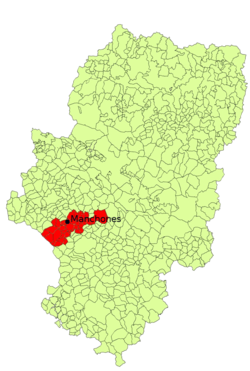Manchones
| Manchones | |||
|---|---|---|---|
| Municipality and village | |||

view of Manchones from the south
|
|||
|
|||
 Location of Machones within Campo de Daroca in Aragon |
|||
| Coordinates: 41°09′N 1°28′W / 41.150°N 1.467°W | |||
| Country | Spain | ||
| Autonomous community | Aragon | ||
| Province | Zaragoza | ||
| Comarca | Campo de Daroca | ||
| Government | |||
| • Alcade | Jesús Pardillos Julián | ||
| Area | |||
| • Total | 27 km2 (10 sq mi) | ||
| Elevation | 756 m (2,480 ft) | ||
| Population (2010) | |||
| • Total | 123 | ||
| • Density | 4.5/km2 (12/sq mi) | ||
| Time zone | CET (UTC+1) | ||
| • Summer (DST) | CEST (UTC+2) | ||
| Postcode | 50366 | ||
| Area code(s) | 976 | ||
Manchones is a municipality in the province of Zaragoza, Aragon, Spain. According to the Spanish Statistical Institute (INE), the municipality had a population of 123 inhabitants in 2010. The pueblo is in the comarca of Campo de Daroca, about 6 kilometres (3.7 mi) northwest of Daroca and just southeast of Murero in the Calatayud-Daroca depression. The Jiloca River passes to the west.
The parish church is dedicated to the Conversion of St Paul. There are some remnants of defensive walls from the time of the Reconquista, when Alfonso the Battler, king of Aragon, forced a route through towards Valencia from Zaragoza.
Manchones is a small settlement situated at the base of a hill in the valley of the river Jiloca, between Calatayud and Daroca. The pueblo lies on an ancient route between the Meseta Central, the Ebro and the coast of the Levante, which was certainly established in Roman times.
Prehistoric remains have been found in the area and there is some evidence of Celtiberian settlement in Manchones. It has been suggested that the name of the pueblo derives from mancusos, gold coins in circulation in Aragon during the 11th century.
Diego López de Lobera, who served under Alfonso the Battler during the Reconquista, was given the castle of Manchones in 1152. In 1248, by grant from Jaime I of Aragon, Manchones was freed from its dependence on Daroca, becoming part of the Community of Daroca Villages, which was dissolved in 1838.
...
Wikipedia



